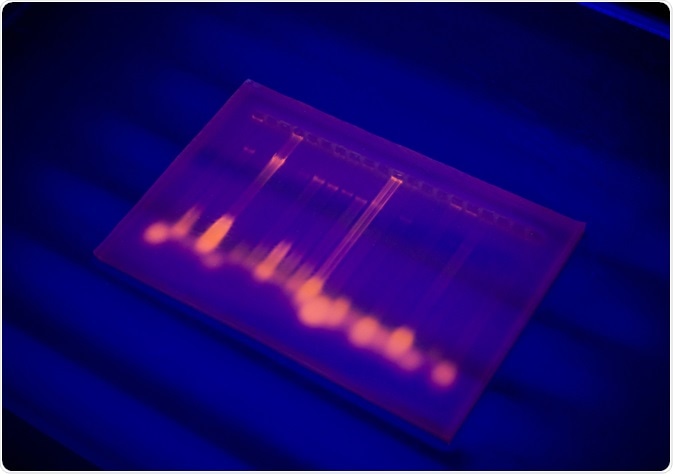The polymerase chain reaction (PCR) is a molecular method that is employed for in vitro amplification of a specific region in a strand of deoxyribonucleic acid (DNA). Multiplex PCR involves the amplification and sequencing of a several fragments of DNA in a single reaction.
 Image Credit: Nikolay Chaban / Shutterstock
Image Credit: Nikolay Chaban / Shutterstock
Multiplex PCR helps in simultaneous detection of multiple microorganisms (especially those that may cause identical or similar clinical syndromes) and is used in a number of laboratory and clinical methods such as DNA fingerprinting, diagnosis of genetic mutation, and in other areas of molecular genetics.
Optimizing the multiplex PCR process
In multiplex PCR, sequence-specific primers result in the amplification of unique DNA regions (both in individual pairs and in primer combinations) within a single reaction.
Strategic planning and multiple optimization attempts are usually a prerequisite for the development of an effective multiplex PCR. A successful assay requires a primer, optimal concentration of PCR buffer and the correct balance of deoxynucleotides and magnesium chloride.
For the amplification, the reaction requires an , adequate amount of a thermostable DNA polymerase (namely Taq [Thermus aquaticus] DNA polymerase), and template DNA, as well as programmed cycling temperatures.
Some of the important design considerations for a primer used in multiplex PCR are primer length, melting temperature, primer specificity, and control of the formation of primer dimers. An ideal primer length is between 18-22 base pair.
A temperature between 50-60° Celsius is preferred and care should be taken that primer dimers are not formed. Primer dimers can lead to unnecessary amplification. The specificity of the primer is of equal importance as there could be multiple target sequences in one reaction vessel.
Multiplex PCR protocols often require the addition of up to 10 different PCR primer pairs within the same reaction mixture.
To facilitate this, extended primers are also used (e.g. 28 nucleotides as opposed to usual 18-22 nucleotides) in order to improve primer specificity and prevent unwanted annealing interactions between primers.
Choosing the right assay
There are many multiplex PCR kits available in the market that purport to be ready for use and that require no optimization.
Although these kits contain the right amount of reagents such as buffers, DNA polymerases, or deoxyribonucleotide triphosphates, it is imperative to optimize the concentration of primers and thermocycling conditions in order to achieve stable and balanced reactions.
Meticulous validation and evaluation of any new multiplex PCR procedure is crucial. Wherever possible, external and internal quality controls should be diligently applied.
When dealing with novel multiplex systems, the minimum number of templates that are necessary for positive amplification should be used.
The specificity of an assay should be adjusted and optimized as per the study requirement. To get the desired result, researchers suggest the use of a known amount of extracted (total) DNA of the target organism as a template.
Applications of multiplex PCR
Multiplex PCR has found its application in the analysis of mutations and gene deletion, pathogen identification, single nucleotide polymorphism (SNP) genotyping, study of RNA and in forensic studies.
Recently, this technique has been frequently employed to examine population genetics, to track a disease outbreak in a community, in molecular species identification, to appraise trophic interactions, as well as in food safety.
The broad potential of multiplex PCR is also mirrored in the ever-increasing numbers of scientific and practical publications that have successfully adopted this method.
Sources:
- https://www.ncbi.nlm.nih.gov/pubmed/11835531
- https://www.ncbi.nlm.nih.gov/pmc/articles/PMC3573865/
- https://www.sciencedirect.com/science/article/pii/S1198743X17306493
- van Pelt-Verkuil E, van Belikum A, Hays JP. Principles and Technical Aspects of PCR Amplification. Springer Science & Business Media, 2008; pp. 63-90.
- http://www.premierbiosoft.com/tech_notes/multiplex-pcr.html
Further Reading
Last Updated: Feb 26, 2019